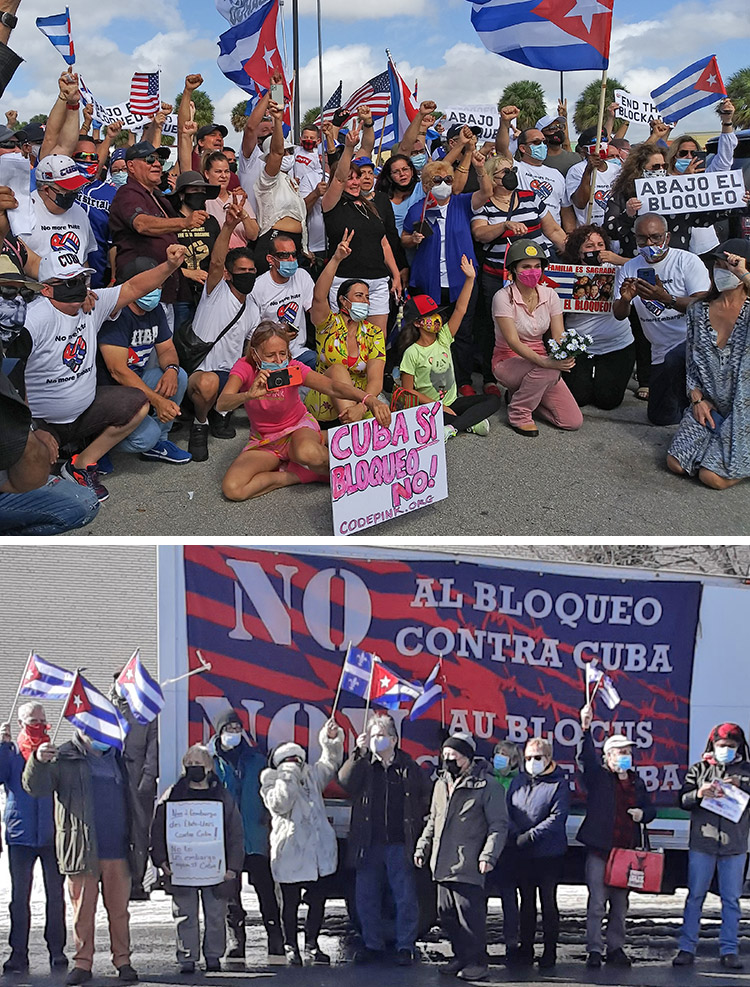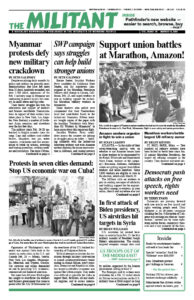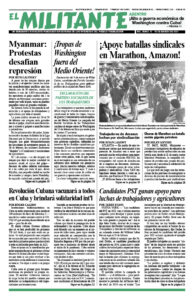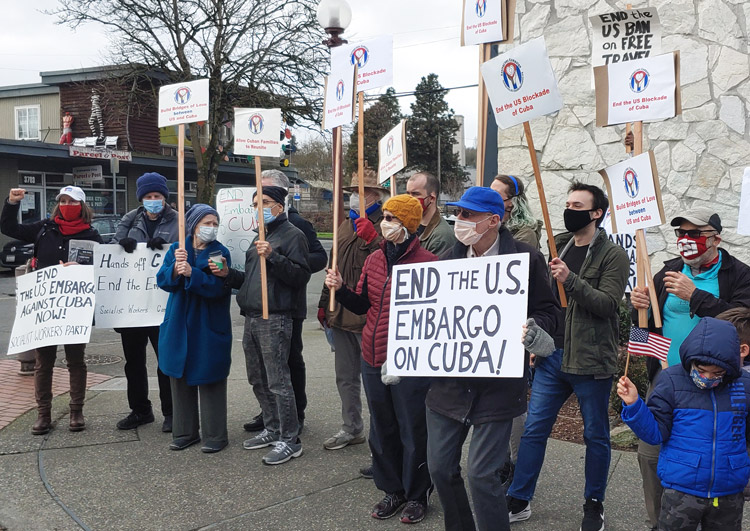Opponents of Washington’s economic war against Cuba took to the streets in seven cities in the U.S. and Canada Feb. 28 — Miami, Seattle, New York, Los Angeles, Minneapolis, Montreal, and Ottawa, Ontario. Car caravans and rallies demanded an end to punishing U.S. economic, commercial and financial sanctions.
For more than 60 years Washington has sought to overthrow the workers and farmers government that came to power after the July 26 Movement led the overthrow of the U.S.-backed dictatorship of Fulgencio Batista.
With all attempts to destroy the revolution through military intervention or armed counterrevolutionary bands ending in dismal failure, every president, Democrat and Republican alike, has waged a relentless economic war against the Cuban people. They make it as difficult as possible for Cuba to import food, fertilizer, oil and medical supplies, and to access international banking services and more.
In the latest move, on Feb. 24 President Joseph Biden renewed Washington’s declaration of a “national emergency with respect to Cuba.” First imposed by then President William Clinton in 1996, this gives the Department of Homeland Security the authority to take possession of any ship in U.S. waters that Washington says might travel to or from Cuba without U.S. permission.
Below are reports from several of the Feb. 28 actions.
❖
Montreal
Over 50 people in nearly 25 cars drove through the streets here, sporting Cuban flags and signs denouncing Washington’s embargo against Cuba. The caravan also expressed support for Cuba’s internationalist medical brigades, which provide health care in some of the most underdeveloped regions in the world.

The protest was organized by the Cuban Community in Canada group here and by the Table de concertation de solidarite Quebec-Cuba.
“We will always be Cubans, wherever we are,” participant Yennar Warner, a Cuban who lives here, told the Militant. “The embargo prevents Cuban children from getting proper nutrition.”
Mohammed Abdul, a Walmart worker, was at his first protest. “I came to see the unity among people who are against the embargo,” he said.
Jennie-Laure Sully, from Solidarity Quebec-Haiti, joined the caravan. She noted that hundreds of volunteer Cuban doctors and nurses have provided health care in Haiti, one of the poorest countries in the world. “Without Cuban doctors I think the health situation in Haiti would be very serious. They’ve been there ever since the [2010] earthquake,” she said.
Supporters of the caravan greeted it as it arrived at the U.S. Consulate, handing out informational leaflets to passersby.
“I have never heard of this embargo,” said Gurdeep Singh, a warehouse worker who took a flyer. “It’s very cool to tell people about this.” Originally from India, he supports the Indian farmers’ mass protests.
Miami
“It doesn’t matter if you’re a communist, socialist or capitalist. It doesn’t matter if you’re a Republican or a Democrat,” Robert Diaz told the media during the caravan of 30 bicycles and over 100 cars, made up mostly of Cuban Americans protesting here. “The only one who is suffering this big problem is the Cuban family. We want to lift the embargo for the Cuban family.”
The protest in Miami was the largest here so far in the series of end-of-the-month actions that began last September calling for an end to the embargo, the repeal of the Helms-Burton Act and the return of the Guantánamo military base to Cuba.
The caravan got a friendly response as it drove through Cuban neighborhoods, with some residents coming out of local businesses to wave as it drove by. Caravan participants were urged to meet again at the same location March 28.
Seattle
Twenty-five people participated in a picket line and rally followed by a car caravan here to protest the U.S. embargo. The participants included a half dozen Cuban Americans.
“I am glad to see people here of different generations and different ideologies,” Carlos Lazo of the Bridges of Love, an anti-embargo group he initiated, told the rally. “We are all of one mind to end the U.S. embargo. We need to expand our numbers and keep up these monthly actions.” He led everyone in chanting, “Cuba sí! Bloqueo no!”
Rebecca Williamson, Socialist Workers Party candidate for Seattle City Council, pointed to the more than 200 new U.S. measures over the last four years that have tightened the economic squeeze against the Cuban people. She said it was important to demand that the U.S. get out of Guantánamo, which it occupies against the will of the Cuban people. John Waller from the Seattle Cuba Committee and Jane Cutter of the Party for Socialism and Liberation also spoke.
As the caravan wound its way through South Seattle it was met with thumbs up of support from many drivers and working people out shopping.
Los Angeles
Some 35 people in 20 cars caravanned to protest Washington’s economic embargo against Cuba and demand the opening up of the right to travel and trade with the island.
This was the third monthly caravan sponsored by the LA-US Hands Off Cuba Committee. Speaking at a brief rally at the start, 27-year-old Cuban American Nia Mitchell said she had just returned from Cuba and the situation is difficult for people there with shortages of many items as a result of U.S. sanctions. “We have to let people know what is happening,” she said. This was the first time she and her mother had joined a protest against the embargo.
Mitchell noted that Cuba’s response to COVID-19 and steps to protect its population stands in stark contrast to the lack of adequate care in the U.S. Among others speaking at the kickoff of the caravan were Rachel Brunke, a longtime Cuba solidarity activist from the San Pedro area; Laura Garza, Socialist Workers Party; Mark Friedman, co-chair of the sponsoring group; and Scott Scheffer, Socialist Unity Party.
At the busy intersection at La Brea Avenue and Obama Boulevard participants got out of their cars to hold signs and distribute leaflets demanding an end to Washington’s economic war.
Minneapolis
Passersby responded with honks, waves, raised fists, smiles and thumbs up to the 20 protesters gathered here in solidarity with Cuba. When we told one young man who rolled down his window that we are for ending the U.S. economic embargo against Cuba he responded, “Hands off Cuba!”
“We are part of an international effort to denounce the criminal blockade against Cuba that’s been imposed by the U.S. government for more than half a century,” August Nimtz said for the Minnesota Cuba Committee. “This new administration doesn’t mean anything will change. We need to continue to put pressure on.”
New York City
Horns honking, a car caravan against the U.S. economic war on Cuba rounded Columbus Circle three times and ended with a brief rally at the statue of Cuban revolutionary hero José Martí at the south end of Central Park. This was the third monthly caravan here sponsored by the New York-New Jersey Cuba Sí Coalition. Ten cars and 30 people took part.
Andy Arango, a New York native of Cuban and Puerto Rican descent and a pedicab driver, was one of the speakers at the rally. Arango said as a teenager in Harlem he was attracted to the fight for Black rights. Through that fight, he learned about Cuba’s role in helping to liberate Africa from colonial rule and became a defender of the Cuban Revolution.


